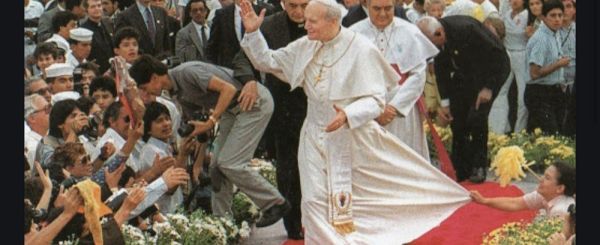13. The great challenge of our time for believers and for all people of good will is that of maintaining truthful and free communication which will help consolidate integral progress in the world. Everyone should know how to foster an attentive discernment and constant vigilance, developing a healthy critical capacity regarding the persuasive force of the communications media.
Also in this field, believers in Christ know that they can count upon the help of the Holy Spirit. Such help is all the more necessary when one considers how greatly the obstacles intrinsic to communication can be increased by ideologies, by the desire for profit or for power, and by rivalries and conflicts between individuals and groups, and also because of human weakness and social troubles. The modern technologies increase to a remarkable extent the speed, quantity and accessibility of communication, but they above all do not favor that delicate exchange which takes place between mind and mind, between heart and heart, and which should characterize any communication at the service of solidarity and love.
Throughout the history of salvation, Christ presents himself to us as the “communicator” of the Father: “God, in these last days, has spoken to us through his Son” (Heb 1:2). The eternal Word made flesh, in communicating Himself, always shows respect for those who listen, teaches understanding of their situation and needs, is moved to compassion for their suffering and to a resolute determination to say to them only what they need to hear without imposition or compromise, deceit or manipulation. Jesus teaches that communication is a moral act, “A good person brings forth good out of a store of goodness, but an evil person brings forth evil out of a store of evil. I tell you, on the Day of Judgment people will render an account for every careless word they speak. By your words you will be acquitted, and by your words you will be condemned.” (Mt 12: 35-37)
14. The apostle Paul has a clear message for those engaged in communications (politicians, professional communicators, spectators), “Therefore, putting away falsehood, speak the truth, each one to his neighbor, for we are members one of another… No foul language should come out of your mouths, but only such as is good for needed edification, that it may impart grace to those who hear” (Eph 4: 25, 29).
To those working in communication, especially to believers involved in this important field of society, I extend the invitation which, from the beginning of my ministry as Pastor of the Universal Church, I have wished to express to the entire world “Do not be afraid!”
Do not be afraid of new technologies! These rank “among the marvelous things” – inter mirifica – which God has placed at our disposal to discover, to use and to make known the truth, also the truth about our dignity and about our destiny as his children, heirs of his eternal Kingdom.
Do not be afraid of being opposed by the world! Jesus has assured us, “I have conquered the world!” (Jn 16:33)
Do not be afraid even of your own weakness and inadequacy! The Divine Master has said, “I am with you always, until the end of the world” (Mt 28:20). Communicate the message of Christ’s hope, grace and love, keeping always alive, in this passing world, the eternal perspective of heaven, a perspective which no communications medium can ever directly communicate, “What eye has not seen, and ear has not heard, and what has not entered the human heart, what God has prepared for those who love him” (1Cor 2:9).
To Mary, who gave us the Word of life, and who kept his unchanging words in her heart, do I entrust the journey of the Church in today’s world. May the Blessed Virgin help us to communicate by every means the beauty and joy of life in Christ our Savior.
[Pope John Paul II, Apostolic Letter to those responsible for social communications, 24 January 2005]












